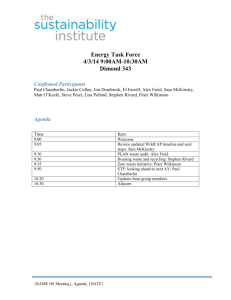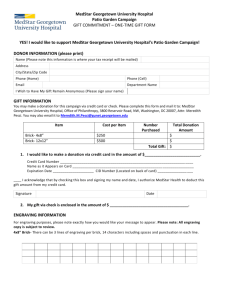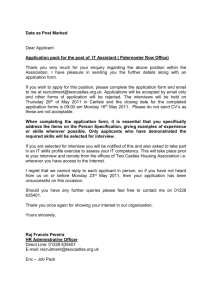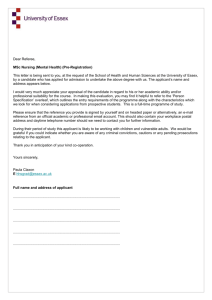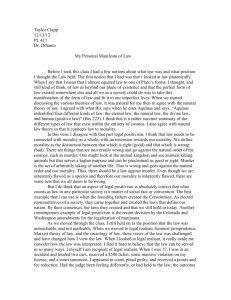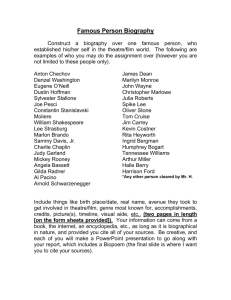3. Who requires a PESCI? - Australian Medical Council
advertisement
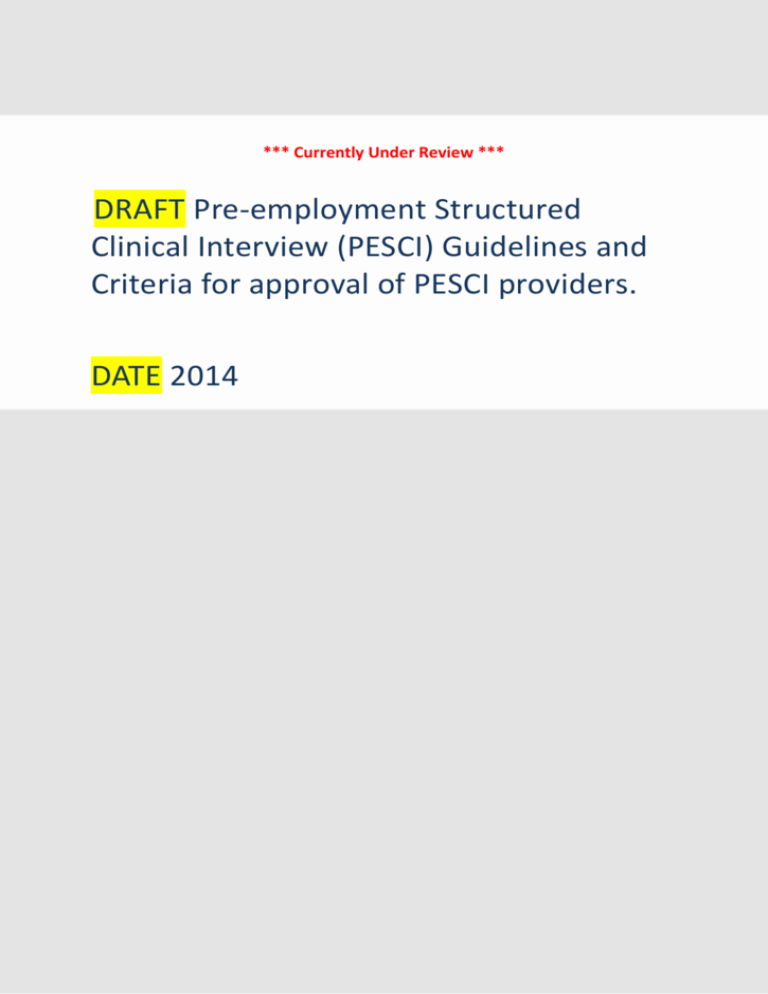
Currently Under Review *** Currently Under Review *** DRAFT Pre-employment Structured Clinical Interview (PESCI) Guidelines and Criteria for approval of PESCI providers. DATE 2014 1 Currently Under Review Contents Part A: Pre-Employment Structured Clinical Interview (PESCI) guidelines .......1 1. Introduction ............................................................................................................................................................. 1 2. What is the purpose of the PESCI? .................................................................................................................. 1 3. Who requires a PESCI? ........................................................................................................................................ 2 4. When in their assessment for registration should international medical graduates complete the PESCI? ............................................................................................................................................. 2 5. When is a PESCI not required? ......................................................................................................................... 2 6. What does a PESCI involve? .............................................................................................................................. 2 7. What organisations are responsible for PESCI standards? .................................................................. 3 8. How does the AMC approve PESCI providers ............................................................................................ 3 9. Definition of terms ................................................................................................................................................ 4 Part B: Criteria for approval of Pre-employment Structured Clinical Interview (PESCI) providers .....................................................................................5 Criteria 1 The context of the PESCI provider ................................................................................................. 5 Criteria 2 Independence ......................................................................................................................................... 5 Criteria 3 Initial assessment of applicant eligibility for PESCI ............................................................... 6 Criteria 4 Position description ............................................................................................................................. 6 Criteria 5 Interview process.................................................................................................................................. 7 Criteria 6 Annual reporting ................................................................................................................................ 10 2 Part A: Pre-employment Structured Clinical Interview (PESCI) guidelines 1. Introduction The Pre-employment Structured Clinical Interview (PESCI) was developed by the AMC in 2007 as part of a 2006 Council of Australian Governments’ directive to ensure nationally consistent assessment of international medical graduates. The PESCI interview is a nationally consistent standardised process conducted according to the AMC PESCI Guidelines and Criteria. The PESCI is an objective assessment of the clinical experience, knowledge, skills and attributes of an international medical graduate to determine whether they are suitable to practise in a specific position. It consists of a structured interview using scenarios. The interview scope is determined by the level of risk of the position that the international medical graduate is applying for. As a part of the PESCI process, there is also a reference check. The PESCI is conducted by a provider that has been approved by the AMC. The applicant pays an interview fee to the PESCI provider. The PESCI guidelines have been developed to provide information to PESCI providers, applicants, health services and jurisdictions about PESCIs. They include an overview of when a PESCI is required, what a PESCI involves, and the roles and responsibilities of stakeholders and AMC approved providers. The ‘Criteria for AMC approval of PESCI providers’ at Part B detail what providers must demonstrate to be granted and maintain AMC approval to conduct PESCIs. 2. What is the purpose of the PESCI? PESCIs are conducted to establish whether an applicant has the knowledge, skills and experience to practise safely and effectively in the position for which registration is being sought. The interview should be constructed to demonstrate that an applicant ‘knows how’ rather than simply ‘knows’. The PESCI is an evaluation for suitability for a particular position. It is not an examination or an assessment of an international medical graduate’s overall performance. The standard expected of the applicant is one of safe practice. Assessors are required to take into consideration the knowledge, skills and experience of the applicant, as well as the orientation and level of supervision and supports that will be available in the position for which the applicant is being assessed. As no pre-employment assessment can provide a guarantee of satisfactory professional performance in the workplace, supervision, especially in the initial stages of employment, is essential. 1 Currently Under Review 3. Who requires a PESCI? A PESCI is mandatory for international medical graduates seeking limited registration in Australia to practise in any of the following roles: general practice; all non-specialist positions of high-risk. A PESCI may be required for other roles. Stakeholders such as health departments need to consult the Medical Board of Australia (local office) if they have questions concerning the effect of local circumstances on the level of risk. The Board decides whether or not a PESCI is required, based on the nature of the position and the level of risk inherent in it. NB. The risk matrix is under revision. It is a guide to illustrate a range of positions according to their inherent risk. It is not intended to provide an exact definition of the positions that will and will not require a PESCI. 4. When in their assessment for registration should international medical graduates complete the PESCI? Applicants for PESCIs must have passed the AMC multiple-choice question (MCQ) examination. The AMC defines the eligibility requirements for its MCQ examination here1. These include completion of primary source verification. Some applicants may also have passed the AMC clinical exam but this is not a pre-requisite. The results of the PESCI may be used by the Medical Board of Australia when assessing applications for limited registration or provisional registration. All Medical Board of Australia registration standards define the general requirements for eligibility for registration. Each registration standard also defines the specific requirements applicable to the type of registration. To avoid delays in registration, applicants for the PESCI should gather the documentation to meet these requirements, described at http://www.medicalboard.gov.au/Registration-Standards.aspx. 5. When is a PESCI not required? International medical graduates with general registration do not require a PESCI. International medical graduates who hold limited registration and are completing the specialist pathway do not require a PESCI, but the Medical Board of Australia will take account of information from the assessment of the relevant specialist college. Competent Authority applicants may require a PESCI if working in general practice. 6. What does a PESCI involve? The PESCI involves a panel of medical practitioners and community members objectively assessing the performance of an applicant using interview techniques and exploration of standardised scenarios. 1 http://www.amc.org.au/images/publications/applying-to-the-amc.pdf 2 Currently Under Review The PESCI provider convenes an interview panel. The panel prepares questions to explore and validate the applicant’s experience according to their curriculum vitae. The PESCI panel categorises the position for which the applicant is being considered against the AMC risk matrix (at Item 3). The panel designs the PESCI to be relevant to the position description and the level of risk that position poses (Criteria 5.3). The interview includes three to five clinical scenarios relevant to the position description to elicit information about how the applicant would diagnose and manage the patients, and to determine the doctor’s ability to analyse clinical situations and apply clinical knowledge in a given situation. The panel may conduct the interview via videoconference if the PESCI provider deems it appropriate, although the AMC approval criteria (Criteria 5.3.3) indicate that face to face interviews are preferable. The panel deliberates and provides advice through the provider to the Medical Board of Australia on the applicant’s suitability for the position. The applicant is responsible for the cost of the PESCI, as determined by the AMC approved PESCI provider. Further information regarding the interview process is detailed at Criteria 5 in Part B: Criteria for AMC approval of PESCI providers. 7. What organisations are responsible for PESCI standards? The AMC is contracted by the Australian Health Practitioner Regulation Agency (on behalf of the Medical Board) to approve PESCI providers. The AMC approves providers to conduct PESCIs on an ongoing basis, subject to providers continuing to demonstrate via annual reports to the AMC that they meet the approval criteria. Approved PESCI providers must conduct PESCIs in accordance with the AMC approval criteria. Following the PESCI, the provider completes both the approved Medical Board of Australia forms: PESCI Report to the Medical Board of Australia; PESCI Outcome report to applicant. The Medical Board of Australia considers the PESCI report in conjunction with other sources of information when making a decision on whether to grant medical registration to the applicant in that position. The PESCI is context specific and the applicant may be registrable in a position of lesser risk if they are deemed not suitable in a higher risk position. The Medical Board of Australia will provide an annual qualitative summary to the AMC on PESCI reports received. The AMC will provide an annual update to the Medical Board of Australia on whether accredited PESCI providers continue to meet the approval criteria. 8. How does the AMC approve PESCI providers An AMC approved PESCI provider has demonstrated that it meets the Criteria for AMC approval of PESCI providers. 3 Currently Under Review The AMC’s Prevocational Standards Accreditation Committee considers submissions by proposed new PESCI providers and makes a recommendation to the AMC Directors on whether the provider meets the approval criteria. The Directors then determine if approval is granted. The Committee monitors approved PESCI providers against the approval criteria via progress reports on an annual basis, or more frequently if required. The list of AMC approved PESCI providers is available on the AMC website here. Queries on seeking approval to become a PESCI provider can be sent to the AMC at accreditation@amc.org.au. Applicants should contact a PESCI provider with any queries. AMC undertakes assessments and monitoring of approved and accredited organisations on a cost-recovery basis. Organisations seeking approval or accreditation pay the direct cost of the assessment. 9. Definition of terms The provider The body seeking accreditation, which may be a health service, a jurisdiction, a specialist college or similar. The applicant The international medical graduate undertaking the PESCI The panel The selected group of interviewers, as per Criteria 5.2 Clinical supervisor A medical practitioner who supervises the intern while they are assessing and managing patients. The AMC defines a suitable immediate clinical supervisor as someone with general registration and at least three years' postgraduate experience. The Primary Clinical Supervisor should be a consultant or senior medical practitioner. 4 Currently Under Review Part B: Criteria for approval of Preemployment Structured Clinical Interview (PESCI) providers Health care providers seeking approval to conduct PESCIs must address the criteria in a submission to the AMC’s Prevocational Standards Accreditation Committee. Approved PESCI providers must report to the AMC against the criteria on an annual basis. Criteria 1 The context of the PESCI provider 1.1 The provider is an organisation with appropriate governance structures in place and the expertise and resources to conduct the interview. 1.2 The provider has defined the types of positions for which it will conduct PESCIs (e.g. hospital and/or GP positions). 1.3 The provider has ongoing capacity to conduct PESCIs. 1.4 The provider has effective partnerships with the Medical Board of Australia / AHPRA, and with its own stakeholders including employers and recruiters as relevant. 1.5 The provider has an appropriate profile of professional and general staff who oversee the PESCI process. 1.6 The provider maintains a current bank of appropriately qualified assessors: 1.6.1 The provider defines and follows a process to appoint new assessors. 1.6.2 The provider ensures the adequate training of new assessors and has a process for regular calibration of all assessors. 1.6.3 The provider has a process for verification of assessor qualifications and regular review of suitability. Criteria 2 2.1 Independence The provider carries out the PESCI process independent on undue influence from any stakeholder 5 Currently Under Review 2.2 The PESCI provider has developed and follows procedures for identifying, managing and recording conflicts of interest in the work of its PESCI panels and in decision making about PESCI outcomes. 2.3 The provider collates panel members’ declarations of interest and reviews potential biases in relation to assessing an applicant. The provider manages potential conflicts or biases conservatively. It does not use a panel member where there is a perception of conflict or bias or a real conflict or bias. Criteria 3 Initial assessment of applicant eligibility for PESCI 3.1 The provider has a process to ensure that the applicant has been verified as a medical practitioner and is qualified for limited or provisional registration, prior to conducting the PESCI. 3.2 The provider has a process that assesses the applicant against the position description prior to conducting the PESCI. Notes: Applicants for PESCIs must have passed the AMC CAT MCQ examination or have Advanced Standing under the Competent Authority pathway. Some applicants may also have passed the AMC Clinical Examination but this is not a pre-requisite. The PESCI may be used in assessing applications for limited registration or provisional registration. Providers are not approved to conduct PESCIs for medical practitioners in the specialist pathway. Criteria 4 4.1 Position description The provider creates a position description that: states the location, scope and level of the position in sufficient detail to enable a common understanding of the responsibilities of the position by the international medical graduate, employer, assessors, supervisor(s) and Medical Board; includes the demographics of the location to be worked in and local services available; enables the position to be located on the risk matrix (see Part A, Item 3); meets the requirements of the Medical Board of Australia; states the orientation arrangements; states the supervision arrangements in sufficient detail to enable understanding by the international medical graduate, employer, assessors, clinical supervisor(s) and the Board; 6 Currently Under Review states the names of the principal clinical supervisor and co-supervisor(s) and their workplace location/s; states the mandatory and highly desirable selection criteria. 4.2 The PESCI panel considers the position description when assessing an international medical graduate’s suitability for employment and registration. 4.3 The PESCI provider has a process to consistently categorise positions according to risk using the AMC risk matrix (see Part A, Item 3). The types of position that will require a PESCI are clearly defined. 4.4 The provider obtains a curriculum vitae (CV) containing all relevant qualifications for each PESCI applicant. The CV includes a full work experience history with no gaps in its chronology that accounts for all working and non-working periods. Notes: It is accepted that position descriptions may vary between health services. Providers must ensure that the position description includes the above items when submitting to the Medical Board of Australia. The risk matrix for the Standard Pathway is included at Part A, Item 3 of the PESCI guidelines. The risk matrix is a guide intended to illustrate a range of positions according to their inherent risk. It is expected that stakeholders such as the employer, the health department and the state or territory AHPRA office inform the Board of the relevant local circumstances in relation to the risk. Criteria 5 Interview process 5.1 The provider’s PESCI process is clearly described for all stakeholders and published on its website. 5.2 Interview panel 5.2.1 The provider constitutes PESCI interview panels with a minimum of three interviewers. Each panel includes: two medical practitioners who are appropriately qualified, preferably in the same field of medicine as the position for the international medical graduate, have recent clinical experience, and are completely familiar with the clinical and professional demands of the type of position for which the international medical graduate is being interviewed; 5.2.2 at least one other interviewer who may be a health professional, a lay person, or a medical practitioner,. The provider must have a process to ensure that interviewers: do not have conditions imposed on their registration or undertakings accepted by the Board as a result of health, performance or conduct issues; are not a relative or domestic partner of the applicant; 7 Currently Under Review 5.3 are not an employee of the applicant and are not a potential employer of the applicant. Interview arrangements 5.3.1 The provider provides the relevant documentation to the interviewers prior to the interview. This is to enable the interviewers individually to conduct a preliminary assessment of the applicant’s suitability and as a group to plan the interview content based on the defined category of risk. 5.3.2 The provider has a process to confirm the identity of the applicant on presentation for the interview. 5.3.3 The provider aims to conduct face-to-face interviews as its preferred option. 5.3.4 If teleconferencing or video-conferencing is used, the provider has processes to: confirm the identity of the interviewer; reliably invigilate to ensure that the applicant is not assisted during the interview; maintain the integrity of the interview. Notes: The PESCI may include clinical simulation, hypothetical scenarios and/or clinical scenarios from the applicant’s experience. If physical examination skills and procedural skills are not applicable for the interview, the Panel should select ‘not applicable’ in the interview report form. 5.4 Interview content 5.4.1 The provider ensures that the content of the interview: is drawn, at least in part, from a secure bank of relevant scenarios for which the expected responses and essential, critical factors have been pre-determined. The bank should have sufficient numbers of items to avoid multiple re-uses of scenarios. is directly related to the content of the position description. includes at least three detailed scenarios or five or more simple scenarios (either posed or experiential). as far as possible, simulates a patient consultation with investigation results, imaging, ECGs etc incorporated as appropriate. assesses the applicant in each of the following areas, as appropriate: o Medical Interviewing skills; o Physical Examination skills; o Clinical Judgment; o Treatment / Advice; o Communication skills; 8 Currently Under Review o Professionalism; o Procedural skills. assesses the applicant’s knowledge of, respect for, and sensitivity towards, the social and cultural needs of the community to be served, including those of Indigenous Australians. Notes: The standard expected of the applicant is one of safe practice. Assessors are also required to take into consideration the orientation and level of supervision and supports that will be available in the position for which the applicant is being assessed. The panel should report on these considerations and make recommendations around this as required. The provider ensures that the integrity of the interview content is never compromised. It does not provide written material that documents the interview content to the international medical graduate, sponsor or employer. 5.5 Report to the Medical Board of Australia 5.5.1 5.6 the interview content; the strengths and weaknesses of the applicant’s responses; any general concerns that arose during the interview; the applicant’s suitability for the position, giving reasons; any specific recommendations, for example, pre-commencement courses, clinical placements in relation to successful applicants. 5.5.2 The provider ensures that the report is finalised and provided to the relevant AHPRA office within one week of the interview date. 5.5.3 The provider includes the position description with the report to AHPRA. Outcome reports to the applicant 5.6.1 5.6.2 5.7 The provider ensures that the interview panel use the AHPRA PESCI Report to the Medical Board of Australia template to document: In the outcome report the provider documents: the applicant’s suitability for the position, giving reasons; any specific recommendations, for example, pre-commencement courses, cultural training, clinical placements in relation to successful applicants. The provider ensures that the report can be finalised and provided to the sponsor /employer, applicant and the AHPRA / Board within one week of the interview date. Review / Appeal 5.7.1 The provider has published processes for complaints, review and appeals that are rigorous, fair and responsive. 9 Currently Under Review 5.7.2 Criteria 6 6.1 The procedures define the grounds for complaint/appeal, the process for complaint/appeal, and the possible outcomes including circumstances in which a second PESCI will be made available. Annual reporting The AMC approved PESCI provider submits an annual report to the AMC that: reports against each approval criteria, noting any changes in the provider’s circumstances; includes data on how many PESCIs have been conducted, and how many applicants were found suitable or not suitable. For those found suitable, reports what supports or supervision were required; reports on the number of scenarios the provider has and how often each is used; reports on the number of assessors in the assessor bank and how many have been used in the past twelve months; reports on the number of PESCIs conducted via videoconference; provides a self-analysis of the quality of assessors and quality of scenarios; reports on any appeals considered and the outcomes of those; details any changes to its capacity to deliver, or plans for any changes in the coming year. 10


